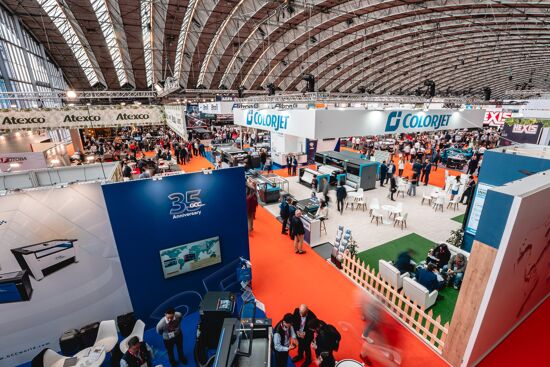Personalised products - the future of Digital Printing

Customers are becoming more conscious of their consumption. There is an increasing demand for authentic, personalised products which is taking over plain industrial goods. For printers, this offers a new sustainable growth opportunity.
Cheap throwaway T-shirts and seasonal decor are a few examples that are contributing towards climate change and the energy crisis. Other factors that contribute are disrupted supply chains and inflation which leads to more people questioning these practices.
It is important to taken into account sustainable consumption instead of fast fashion and fast decor. Over 50% of people surveyed in the Statista report "Sustainable Consumption in Germany 2021" believe that their behaviour can help to solving environmental problems.
People who consume less often are attracted to products that are long lasting and meaningful. Products that are personalised or tailored specifically to the individual are the most suitable. This offers several opportunities for digital printers.
 CAPTION: Personalised hairbrush at the online shop of DM drugstores.
CAPTION: Personalised hairbrush at the online shop of DM drugstores.
Personalised products: from the idea to the business model
Whether it is for a trade fair, an exhibition or a gift for a customer, nearly every printer has printed a personalised product. However, to turn a novelty idea into a realistic business model, there are some factors to consider. These include:
- Access to good communication with a large enough target group
- A sales opportunity must be created
- The products must be easily customisable by the customer
- The fast and reliable production of the article must be guaranteed
- Ordering and logistics processes must be mostly automate
 CAPTION: Personalised product as a funny gift: fragrance Christmas ornament from Radbag.de. Image credit: Radbag.de
CAPTION: Personalised product as a funny gift: fragrance Christmas ornament from Radbag.de. Image credit: Radbag.deInternet is at the heart of everything
To sell personalised products, the internet is required. Customers can be contacted worldwide via modular websites or social media platforms such as Facebook or Instagram. These platforms also offer various sales opportunities or allow close integration with Shopify and other e-commerce modules.
RIP manufacturers have already developed workflow solutions that automatically feed website-generated orders for personalised products into a digital print workflow. Some examples of this are Caldera Sports Factory or eProductivity Software's MarketDirect platform.
Due to the numerous versatile all-in-one solutions for digital print workflow and e-commerce, opening a web shop for personalised products is quite easy and cost-efficient.
Regarding the production of items, invoicing and logistics there are platforms such as Byrd that no longer require months of preparations. This is particularly important when it comes to fashionable, popular personalised print products. For trends, speed is key.
Printers with staff experienced in e-commerce operations, have a clear advantage here. Today, having a good product alone is not enough for consumers. To sell personalised products online, the item needs to be easily discovered by a relevant audience, which normally requires effective SEO and can be quite costly.
 CAPTION: Vinyl carpet with motif printed-to-order by Bilderwelten.de. Image credit: Bilderwelten.de /Apalis
CAPTION: Vinyl carpet with motif printed-to-order by Bilderwelten.de. Image credit: Bilderwelten.de /Apalis
Which individualised digital print products are suitable for e-commerce?
Today, there are a wide range of products that can be personalised with digital printing and this continues to grow. This is particularly true in fashion, gifts and printed interior décor. At online shops such as Bilderwelten.de , consumers can order hundreds of items ranging from printed yoga mats to vinyl kitchen backsplashes.
Spreadshirt offers personalised, printed, embroidered or flock textiles to B2B and B2C customers. Another frequently used production method is engraving. At Signuu customers can order a wide selection of personalised jewellery and gift items using laser engraving.
The drugstore chain DM offers personalised brushes and individually printed labels for selected cosmetic products from their own brand. This is part of their “Fotoparadies” campaign. The photo products are produced in cooperation with Cewe, Germany’s biggest photo and gift supplier.
Radbag, a specialist online shop offers printed fragrance ornaments, boxer shorts, lamps, beer mugs and many other personalised gifts in eclectic designs. The products are made entirely in-house with the blanks for the unique products being sourced from various suppliers.
Is it still viable to branch out into personalised products?
One offs and or limited-edition products that are produced as locally as possible are likely to be in greater demand in the future. This does not just include photo gifts and other inexpensive products, but has now extended into the market of upscale and luxury products. This makes personalisation more mainstream.
Therefore, printers can likely expect an increase in demand for digital direct and sublimation printing on objects. In addition, an increase in finishing services such as cutting, folding and engraving.
Printers with the appropriate infrastructure already in place, can also branch out from short-term fashion hypes such as printed textile masks. This depends on if they are able to quickly set up web shops. Collaborating with strong brands and large retailers is also another option.
Discover FESPA’s new event, The Personalisation Experience, exploring and showcasing the latest innovations in personalisation. The Personalisation Experience will bring together 3,500 stakeholders from retailers, brands, agencies to printers and fulfilment houses, connecting them with software providers and OEMs to explore the potential of personalisation in sportswear, packaging, product, loyalty and custom interiors. Four one-day conferences, plus an application showcase incorporating Printeriors, will bring this core topic to life. For more information please click here.
Topics
Interested in joining our community?
Enquire today about joining your local FESPA Association or FESPA Direct
Recent news

GenAI + POD: The Smartest Way to Add Personalised Products to Your Retail Offering in 2025
In 2025, GenAI and POD are transforming retail. Masterpiece AI empowers businesses to offer unique, AI-generated personalised products, from apparel to home decor. Customers use text prompts to create custom designs, streamlining production and boosting sales. This revolutionises customer experience and product offerings.
.png?width=550)
What qualities should visionaries in print have? With Folker Stachetzki from Brother
We speak to Folker Stachetzki, Head of Marketing at Brother about visionaries in print.

Bolstering personalisation by combining print and digital technology
Using printed material in combination with digital technologies offers more opportunities to those offering personalisation to customers. Rob Fletcher shares some recent examples of the print and digital working together to enhance the impact of personalised pieces.

European Sign Expo to highlight developments shaping the future of signage and visual communications
European Sign Expo 2025 (6 – 9 May, Messe Berlin, Germany) is weeks away and a host of leading exhibitors are all set to welcome Visionaries from across the signage and visual communications industries to their stands.